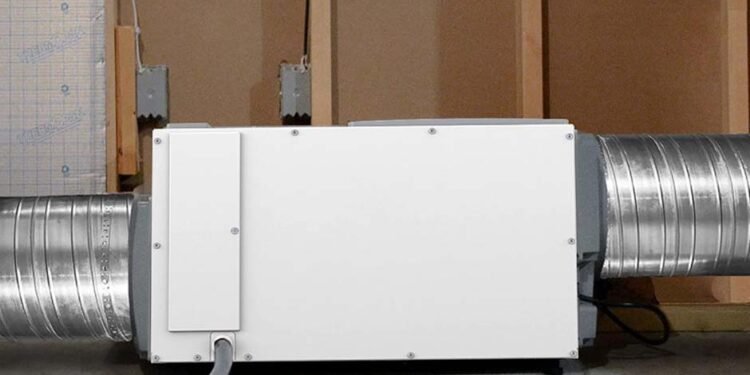Introduction to Dehumidifiers and Their Benefits
Dehumidifiers are multifaceted devices that do more than ward off damp and musty odors; they are strategic investments that contribute significantly to home comfort and health. These devices reduce moisture levels in the air, thereby preventing the growth of mold and mildew. In addition, dehumidifiers enhance indoor air quality and can even improve the efficiency of other home appliances. But did you know installing a dehumidifier can offer substantial long-term savings?
Reducing Energy Costs
A primary way that dehumidifiers contribute to long-term savings is by reducing energy costs. Many people are unaware that high humidity can make air conditioners work significantly harder, leading to higher electricity consumption. When an air conditioning unit is battling high moisture, it uses more energy to cool the indoor environment. Installing a dehumidifier helps maintain an optimal humidity level, allowing your air conditioner to operate more efficiently. While initial costs and installations might seem daunting, many professional dehumidifier installation services are available to help you seamlessly embark on this cost-effective endeavor. The energy savings are tangible. According to the U.S. Department of Energy, using a dehumidifier with an air conditioner can drastically decrease energy usage. This reduction directly translates into lower electricity bills, making a noticeable impact on household expenses over time.
Extending the Lifespan of Your HVAC System
- Less wear and tear:HVAC systems in high-humidity environments work harder, accumulating more wear and tear than those in balanced air conditions. Using a dehumidifier to lower humidity levels significantly reduces the strain on your HVAC system, contributing to its durability.
- Fewer repairs:High humidity can lead to more frequent and often costly repairs for your HVAC system. Moisture is a nemesis to mechanical and electrical components, causing them to deteriorate faster. With reduced humidity, repairs become less frequent and less burdensome financially.
- Longer lifespan:With a decreased workload and fewer repairs, your HVAC system will likely enjoy an extended lifespan. This means delayed replacement costs, allowing you more time to save for a future investment, thereby offering substantial long-term savings.
Preventing Mold and Structural Damage
Mold is not only an eyesore; it presents a serious health hazard to you and your loved ones. Mold spores have the potential to cause allergies, respiratory problems, and other health issues. In addition, mold can undermine the stability of your house, resulting in expensive fixes. A dehumidifier can effectively prevent mold growth and subsequent damage by maintaining optimal humidity levels. As the Environmental Protection Agency (EPA) noted, controlling indoor humidity is essential for mold prevention. Reduced mold-related issues mean fewer health risks and less expenditure on medical treatments or structural repairs, contributing to significant savings over time.
Safeguarding Your Furniture and Belongings
High moisture levels can accelerate the deterioration of wooden furniture, musical instruments, books, and other precious belongings. Wood can warp, books can mold, and electronics can corrode when exposed to excessive humidity. Replacing these items can be costly. A dehumidifier helps maintain low moisture levels, preserving the condition and longevity of these items. As a result, you save money on replacements and repairs, ensuring that your belongings remain in good condition for longer.
Improving Overall Air Quality
The quality of indoor air directly impacts your health and well-being. High humidity can make the air feel thick and uncomfortable, potentially exacerbating allergies and other respiratory conditions such as asthma. Persistent humidity can also encourage the proliferation of dust mites, another common allergen. A dehumidifier significantly improves indoor air quality by keeping the humidity at a comfortable level. This improvement can lead to fewer respiratory issues, fewer trips to the doctor, and reduced medical expenses, further enhancing your long-term savings.
Winter Savings
It might come as a surprise, but dehumidifiers can also help you save during winter months. High humidity in winter can make your home feel colder than it is, prompting you to turn up the heat. By regulating humidity levels, a dehumidifier helps your home feel warmer at lower temperatures, reducing your heating bills. This efficient climate control means that your heating system will consume less energy, providing cost savings during the colder seasons.
Choosing the Right Dehumidifier
- Assess your humidity levels:Use a hygrometer to measure the humidity in your home. This tool will help you determine the current moisture levels and the appropriate size and type of dehumidifier required for your space.
- Consider your space:Different rooms and areas may have varying humidity problems. For instance, basements typically have higher humidity levels and might require more powerful dehumidifiers than bedrooms or living rooms. Choose a dehumidifier that is suitable for each specific area’s needs.
- Energy efficiency:Opt for dehumidifiers with Energy Star ratings. These models are designed to use less energy while providing optimal dehumidification, ensuring you get the most efficient device that contributes to energy savings and effective humidity control.
Conclusion
Installing a dehumidifier is an investment that enhances comfort and health and offers substantial long-term savings. A dehumidifier provides many benefits, from reducing energy costs and preventing costly home repairs to improving air quality and safeguarding your belongings. Whether you are looking to protect your home, investments, or health, a dehumidifier is a wise choice with enduring advantages. With numerous professional dehumidifier installation services, making this investment is easier than ever. By installing a dehumidifier, you are setting yourself up for a more comfortable, healthier, and economically sound future.












